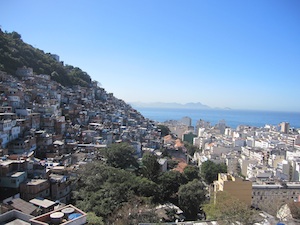As Brazil gears up to host the World Cup in 2014 and the Olympics in 2016, authorities are investing billions of dollars in overhauling infrastructure, building facilities and improving security in cities soon to see the spotlight. The race to “clean up” cities before the events threatens to push thousands of poor residents from their homes and jobs.
Projects linked to the games have already led to evictions of thousands of families in at least eight cities, often without adequate plans for relocation, sufficient compensation or involvement of local communities, said Raquel Rolnik, United Nations Special Rapporteur on the right to adequate housing, in April.
Brazil has enacted laws protecting squatters’ right to occupy land, but the games are speeding up projects that allow authorities to evict people under eminent domain provisions.
Last year, the mayor of Rio de Janeiro, which will host both the Olympics and World Cup final, announced a $4.5 billion plan to redevelop hundreds of favelas, including tearing down 123 areas and relocating 13,000 families. Three expressways for buses, to be built by 2016, will pass through several favelas home to thousands.
Although some relocation is necessary for infrastructural improvements, authorities do not always negotiate with communities or give required compensation, according to Theresa Williamson, who has worked with grassroots groups in Rio for more than a decade. Williamson is the founder of Catalytic Communities, a nonprofit organization that is training youth from favelas to use reporting and social media tools to bring attention to evictions and share local perspectives on the mega-events. The organization started Favela.info and its English-language counterpart RioOnWatch.org to publish local news online.

The Favela de Metrô near Rio’s Maracan Stadium, founded in the 1970s and once home to 1,000 residents, is a prime example of the government’s “divide-and-conquer” strategy, according to Williamson. Last November, authorities began evicting families there to make room for World Cup parking. When residents received relocation notices, many signed off, thinking they would be left homeless, Williamson says.
“They were then taken in buses, crying, hysterical, almost immediately” to an area run by militias, three hours away, Williamson says. The public housing units there were far worse than the homes residents had built over decades. They were dislocated from jobs and schools and no longer allowed to run businesses out of their homes.
“They’re sent backwards by decades,” Williamson says.
Surrounded by bulldozed homes, those left behind have little bargaining power.
Although projects like public transit upgrades, community policing units and tree planting promise long-lasting benefits, some displacement is only facilitating real-estate speculation, according to Williamson. The impending games have doubled property values, and gentrification is pushing families out of more established favelas, she said.
Preparations are also displacing informal workers. Street vendors have been evicted from some sites to make way for roads, according to Maira Vanucchi, a researcher in Brazil for StreetNet International, a federation of informal workers’ organizations. She predicts more vendors will be pushed out in the year before the World Cup, as the 12 host cities speed up measures to “clean up” the streets and reserve zones around sites for official sponsors.

“There is also concern that in order to get everything ready for the World Cup on time, the government will declare a virtual state of emergency where the rule of law is laid aside, and that [the] public may support such measures in the general World Cup euphoria,” Vanucchi says.
Earlier this year, StreetNet launched a World Class Cities Campaign in Brazil to bring attention to negative impacts of World Cup preparations on informal workers and help them benefit from business opportunities. They are building on lessons learned from a similar campaign before the 2010 World Cup in South Africa, which like Brazil is among the most unequal nations in the world.
“Fundamental inequalities are only exacerbated when you host a World Cup,” notes David Roberts, a University of Toronto Ph.D. candidate who researched effects of the World Cup on South Africans. He found that police pushed out informal workers, and while jobs were created in the short term, most investment did not benefit average citizens in the long term.
“If there isn’t concerted effort to include social planning in the preparations in Brazil, you’ll have the same thing—it’ll just be an elite event attended by the rich and really only benefit wealthy corporation owners,” Roberts says.
Travelers visiting Brazil can play a key role in minimizing environmental impacts and providing economic benefits to local people rather than just to multinational hotel firms or corporate event sponsors. Here are some ways to help:
- Stay in a locally run hostel or bed-and-breakfast rather than a big hotel.
- Visit local cultural attractions.
- Take public transit.
- Buy from local vendors, not just big chains or official sponsors.
- Follow the latest developments on local blogs, like RioOnWatch and StreetNet.
- Support campaigns such as those run by Amnesty International and StreetNet.
- Spread the word and voice your views.
Read Ethical Traveler's Reprint Policy.
